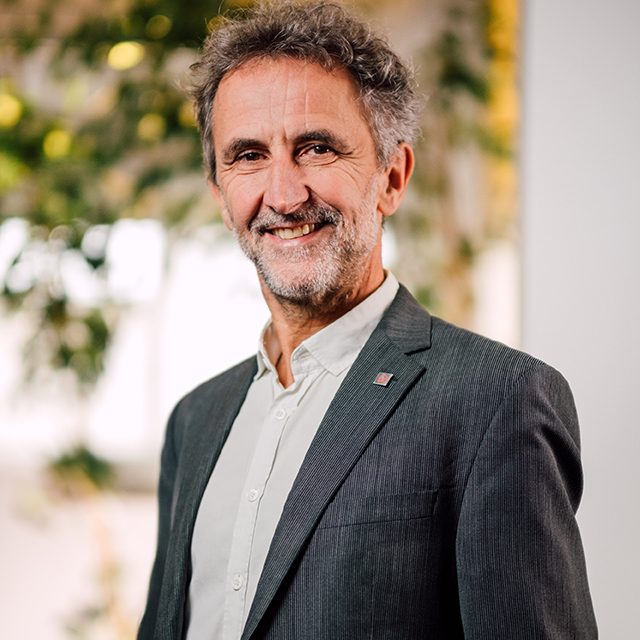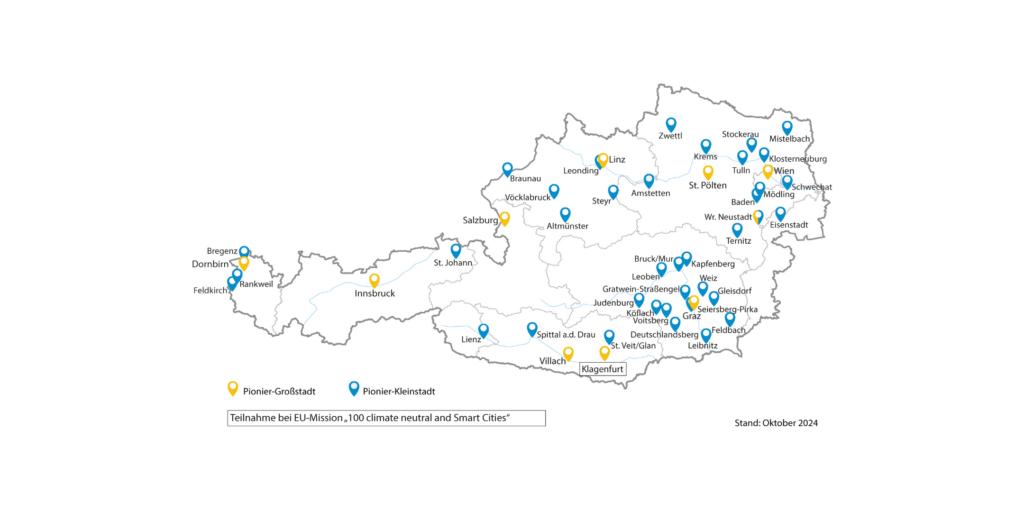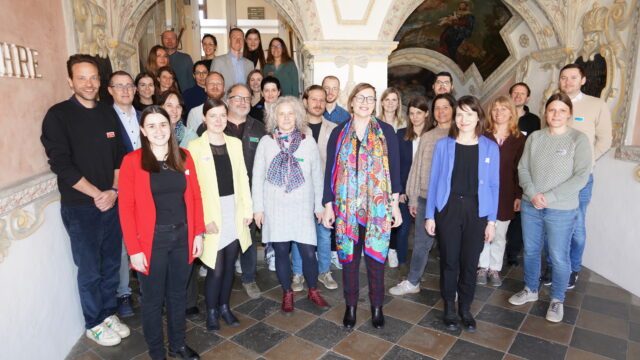Mission ‘Climate-neutral city’
Austria wants to become climate-neutral by 2040. Cities play a key role in this, as they are responsible for three quarters of all CO2 emissions. At the same time, however, they also offer great potential for sustainable solutions. With the ‘Climate Neutral City’ mission, the Climate Protection Ministry (BMK) and the Climate and Energy Fund are supporting cities in becoming climate neutral more quickly through research and development. The SIR takes on the role of ‘city management’, acts as a central point of contact for cities, coordinates knowledge transfer and strengthens cooperation at national and international level.
As part of the mission, cities become pioneers of climate neutrality. The pioneering cities – whether large, medium or small – develop climate neutrality concepts, develop and test innovative solutions in implementation projects and benefit from networking with other municipalities and knowledge transfer within the mission. The cities thus act as learning environments whose findings can be transferred to other municipalities. Thanks to the structured exchange within the mission, they receive targeted support to deal with the administrative structures required for implementation.
Pioneer cities
Ten pioneering cities – i.e. those with over 50,000 inhabitants – have entered into cooperation partnerships with the BMK in which they are pursuing three levels of ambition:
- Administrative structures: Strategies, processes and measures are consistently geared towards climate neutrality. City administrations are being modernised, administrative innovations implemented and alliances formed with companies, research and civil society.
- Climate-neutral neighbourhood: Each pioneering city is launching at least one climate-neutral neighbourhood. This is not just about the size of the projects, but also about synergies, the number of measures implemented and their scalability and transferability. The topics of energy, mobility and the circular economy are particularly important here.
- Learning environment: Pioneering cities share their knowledge with other cities, federal states and European partners. Exchange with other national and international initiatives and participation in innovation projects are essential.
Pioneering small towns
A total of 38 small and medium-sized cities (10,000 to 50,000 inhabitants) are taking part in the ‘Climate Neutral City’ mission. They are being supported by the Climate and Energy Fund to develop comprehensive climate neutrality roadmaps. These plans include visions, sectoral targets and concrete measures with implementation and financing strategies. As a strategic guiding document, they provide orientation and answer the central question: What does climate neutrality mean for our city?
On the one hand, the roadmap creates a common understanding of the key levers for reducing emissions and, on the other, identifies the necessary capacities for implementation and how the administration must adapt structurally in order to achieve the transformation. In this way, climate neutrality is not only defined as a goal, but also as a clear implementation path.
All pioneering cities are involved in the mission’s support process. The accompanying process, coordinated by SIR and implemented in cooperation with AustriaTech and ÖGUT, is the centrepiece of the knowledge exchange. Cities are given access to various formats aimed at building expertise, learning from each other, networking and strategic development. In the formats, the pioneering cities exchange their experiences, are able to refine their strategies, drive forward pilot projects and receive direct information on funding and financing options at federal level, which should make it easier for them to implement their measures in the future.
In terms of content, the accompanying process addresses topics relating to the decarbonisation of energy and mobility systems, the circular economy, building refurbishment, EU directives, climate relevance assessments, greenhouse gas balancing and financing. The content and formats are flexibly adapted to the needs of the cities in order to ensure the best possible support.
With 47 participating cities, the ‘Climate-neutral city’ mission is the largest network of its kind in the EU. In addition to Austria, there are other networks within the European EU mission ‘100 Climate-neutral and Smart Cities’ that support cities in achieving climate neutrality. Through the international exchange between these networks, we expect to gain new perspectives and develop practical solutions for local challenges.
As a city management organisation, the SIR therefore also assumes a central role as an interface to international city networks. This networking makes it possible to bring tried-and-tested solutions from other countries to Austria and at the same time make Austrian approaches visible internationally. The SIR also contributes to introducing strategic, mission-orientated approaches into the Austrian mission. This benefits both the participating cities and the mission itself. In this context, the SIR is active in two international projects:
CapaCITIES
In its role as city management, SIR is a partner in the EU CapaCITIES project. The project supports national and regional administrative levels in improving their governance structures and providing targeted support for cities in order to achieve the objectives of the EU mission. It is funded under the Horizon Europe programme.
The project coordinates actions for and with different city networks in Europe, creating synergies between them and strengthening their co-operation. The aim is to promote knowledge transfer, implement local climate protection measures and link cities with European funding options. Austria benefits from early access to new international developments and innovative solutions for climate-neutral cities.
IEA Cities TCP
The Cities TCP of the International Energy Agency (IEA) is a global initiative to accelerate the decarbonisation of cities. It pools knowledge from various IEA technology programmes and transfers it to the local level. The aim is to support cities with relevant research results, technical solutions and strategic approaches in order to become climate-neutral.
The SIR plays a dual role in the Cities TCP: as city management, it represents the city network, acting as a translator of needs, and as Chair, the SIR currently chairs the Executive Committee. Through this position, the SIR contributes Austrian interests to the international agenda and ensures that cities benefit directly from global knowledge.
The Cities TCP operates
- Knowledge management: Providing a one-stop-shop for decarbonisation strategies in cities.
- Translation of research results: Adapting technical solutions for practical application at municipal level.
- Networking: Promoting dialogue between city networks, technical experts and non-technical stakeholders.
- Annual Report 2023 of the ‘Climate Neutral City’ mission – Climate Neutral City
- Sustainable management – climate-neutral city
- energy innovation austria, Ausgabe 4/2024
- Climate Fund – Mission Climate Neutral City
- Climate-neutral city mission: online presence of the pioneering cities | ÖGUT
- Mission climate neutral ” AustriaTech
- Baseline study on climate-neutral cities ” AustriaTech
- FFG – Climate-neutral city
- CapaCITIES
- Cities-TCP.org – Decarbonising Cities & Communities

Tabea Klier, MSc
Urban networks & transformation

Dr. Cécile Kerebel
Urban networks & transformation

Dr. Nina Mostegl, MRM
Urban networks & transformation

DI Helmut Strasser
Head of Strategy & Innovation

DI Mathias Stadler, BSc
Urban networks & transformation

